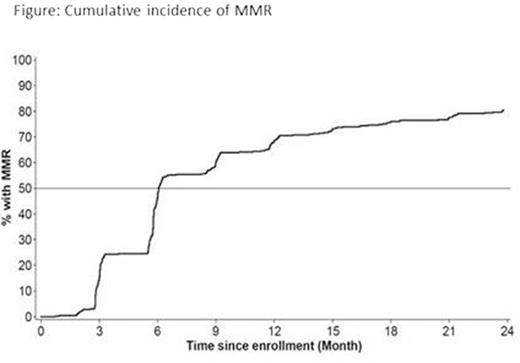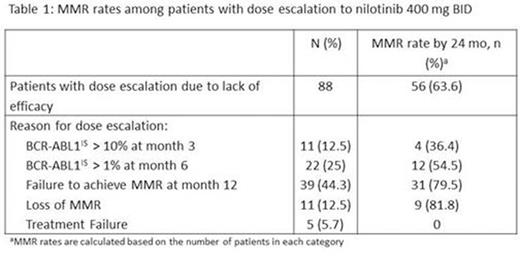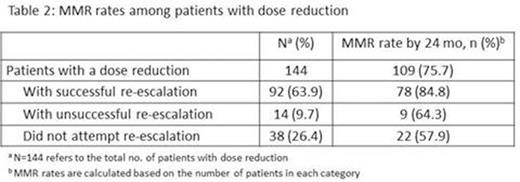Abstract

Background: In the pivotal Evaluating Nilotinib Efficacy and Safety in Clinical Trials-Newly Diagnosed Patients (ENESTnd) study, frontline NIL 300 mg and 400 mg twice daily (BID) resulted in higher rates of deep molecular response and lower rates of disease progression than imatinib in pts with CML-CP. In the ENEST-Extending Molecular Responses (ENESTxtnd) study, the kinetics of molecular response to NIL 300 mg BID and novel dose optimization strategies were evaluated.
Methods: ENESTxtnd was a 24 months (mo), phase 3b study of de novo pts with CML-CP within 6 mo of diagnosis. Primary endpoint was rate of major molecular response (MMR; BCR-ABL1 ≤ 0.1% on the International Scale [IS]) by 12 mo. Initial dose for all pts was NIL 300 mg BID. Dose escalation to NIL 400 mg BID was permitted for pts with suboptimal response (SoR) or treatment failure. Dose reduction to NIL 450 mg once daily (QD) was performed as required by the protocol; reescalation was permitted following adverse event (AE) improvement. Successful reescalation was defined as ≥ 4 weeks of NIL 300 mg BID with no dose adjustments for any AE. Rates of overall survival (OS; considering all deaths during the study) and progression-free survival (PFS; considering events during study treatment) were estimated by Kaplan-Meier analysis.
Results: A total of 421 pts (median age, 48 y; males, 53.7%) were enrolled. Median time on study treatment was 23.7 mo; 328 pts (77.9%) completed 24 mo of treatment, and 93 pts (22.1%) discontinued early due to AEs (n = 43), consent withdrawal (n = 7), disease progression (n = 6), protocol deviation (n = 6), loss to follow-up (n = 5), death (n = 4), pregnancy (n = 2), or other reasons (n = 20).
Of the 92 pts (21.9%) dose-escalated, 88 (20.9%) were dose-escalated due to lack of efficacy (SoR, 83, 19.7%; treatment failure, 5, 1.2%) and 4 due to dosing error; 11 pts were dose-escalated at 3 mo. Of the dose-escalated pts, 5 and 9 pts discontinued due to SoR and treatment failure, respectively. A total of 144 pts (34.2%) had dose reductions, dose reduction due to AEs were reported in 74 pts; 106 pts attempted to reescalate to NIL 300 mg BID, and 92 successfully reescalated. Median duration of exposure of all pts was 23.2 mo and median actual dose intensity was 598.8 mg/d (range, 150-760 mg/d). At 12 mo, 306, 33, 16, and 7 pts were on NIL 300 mg BID, 400 mg BID, 450 mg QD, and other doses respectively; 59 pts had discontinued prior to 12 mo. Of the 306 pts on NIL 300 mg BID at 12 mo, 136 did not have any dose modification (interruption/reduction/escalation) prior to 12 mo and 170 had ≥1 dose modification. Of the 170 pts, 88 had ≥ 1 dose reduction followed by reescalation to 300 mg BID. Among the 16 pts on a reduced dose at 12 mo, 4 later re-escalated to NIL 300 mg BID.
The cumulative MMR rate (95% CI) was 70.8% (66.2%-75.1%) by 12 mo and 81.0% (76.9%-84.6%) by 24 mo (figure). Of the 88 pts with dose escalation due to lack of efficacy, 63.6% achieved MMR by 24 mo (Table 1). Of the 144 pts with dose reduction, 75.7% achieved MMR by 24 mo, including 78 of 92 pts (85%) who successfully reescalated to NIL 300 mg BID (Table 2). The cumulative rate of complete cytogenetic response by 24 mo was 74.1 %.
Ten pts had PFS events on treatment (progression, n = 6; death, n = 4), and 9 deaths were reported at any time on study and during follow-up 2 due to CML; 1 each due to cardiorespiratory arrest, intestinal infarction, acute leukemia, increased intracranial pressure, accident, suicide, and unknown). The estimated rates (95% CI) of PFS and OS at 24 mo were 97.0% (95.1%-98.8%) and 97.6% (96.1%-99.2%), respectively.
The most common nonhematologic drug-related AEs of any grade were rash (15.4%), headache (10.5%), and nausea (10.2%), and new or worsening grade 3/4 laboratory abnormalities were lipase abnormalities (14.5%), neutropenia (11.9%), and thrombocytopenia (10.5%). Cardiovascular events were observed in 19 pts (4.5%), including ischemic heart disease (n = 14), ischemic cerebrovascular events (n = 1), and peripheral artery disease (n = 5).
Conclusion: Dose-optimized frontline NIL resulted in rapid reductions in BCR-ABL1IS levels andvery few progressions or deaths. Most pts achieved MMR by 24 mo, including > 60% of pts who were dose-escalated due to lack of efficacy and > 80% of pts who were successfully reescalated after dose reduction. The safety profile of NIL was consistent with previous studies. These results support the use of NIL 300 mg BID, with dose optimization as necessary, in pts with newly diagnosed CML-CP.
Hughes:ARIAD: Honoraria, Research Funding; Bristol-Myers Squibb: Honoraria, Research Funding; Novartis: Honoraria, Research Funding. Off Label Use: The indicated label for newly diagnosed CML chronic phase patients is 300 mg twice daily. This abstract discusses modifications of this dose.. Salvino:Novartis: Research Funding. Shortt:Novartis, Bristol Meyers Squibb: Honoraria, Other: Sponsorship to attend conferences, Speakers Bureau. Quach:Celgene Corp, ONYX, Janssen, Takeda, Novartis, BMS: Honoraria, Research Funding. Pavlovsky:Novartis - Bristol: Speakers Bureau. Louw:Novartis: Honoraria, Membership on an entity's Board of Directors or advisory committees, Other: Unrestricted educational grant, Research Funding, Speakers Bureau. Shih:Novartis: Membership on an entity's Board of Directors or advisory committees, Research Funding. Turkina:Novartis International AG: Consultancy; Pfizer: Consultancy; Bristol-Myers Squibb: Consultancy. Meillon:Novartis, Bayer, BMS, Pfizer, AMGEN: Honoraria, Speakers Bureau. Jin:Novartis: Employment. Khanna:Novartis: Employment. Dalal:Novartis: Employment, Equity Ownership. Lipton:Ariad: Equity Ownership, Honoraria, Membership on an entity's Board of Directors or advisory committees, Research Funding, Speakers Bureau; BMS: Honoraria, Membership on an entity's Board of Directors or advisory committees, Research Funding, Speakers Bureau; Novartis: Honoraria, Membership on an entity's Board of Directors or advisory committees, Research Funding, Speakers Bureau; Pfizer: Honoraria, Membership on an entity's Board of Directors or advisory committees, Research Funding, Speakers Bureau.
Author notes
Asterisk with author names denotes non-ASH members.

This icon denotes a clinically relevant abstract




